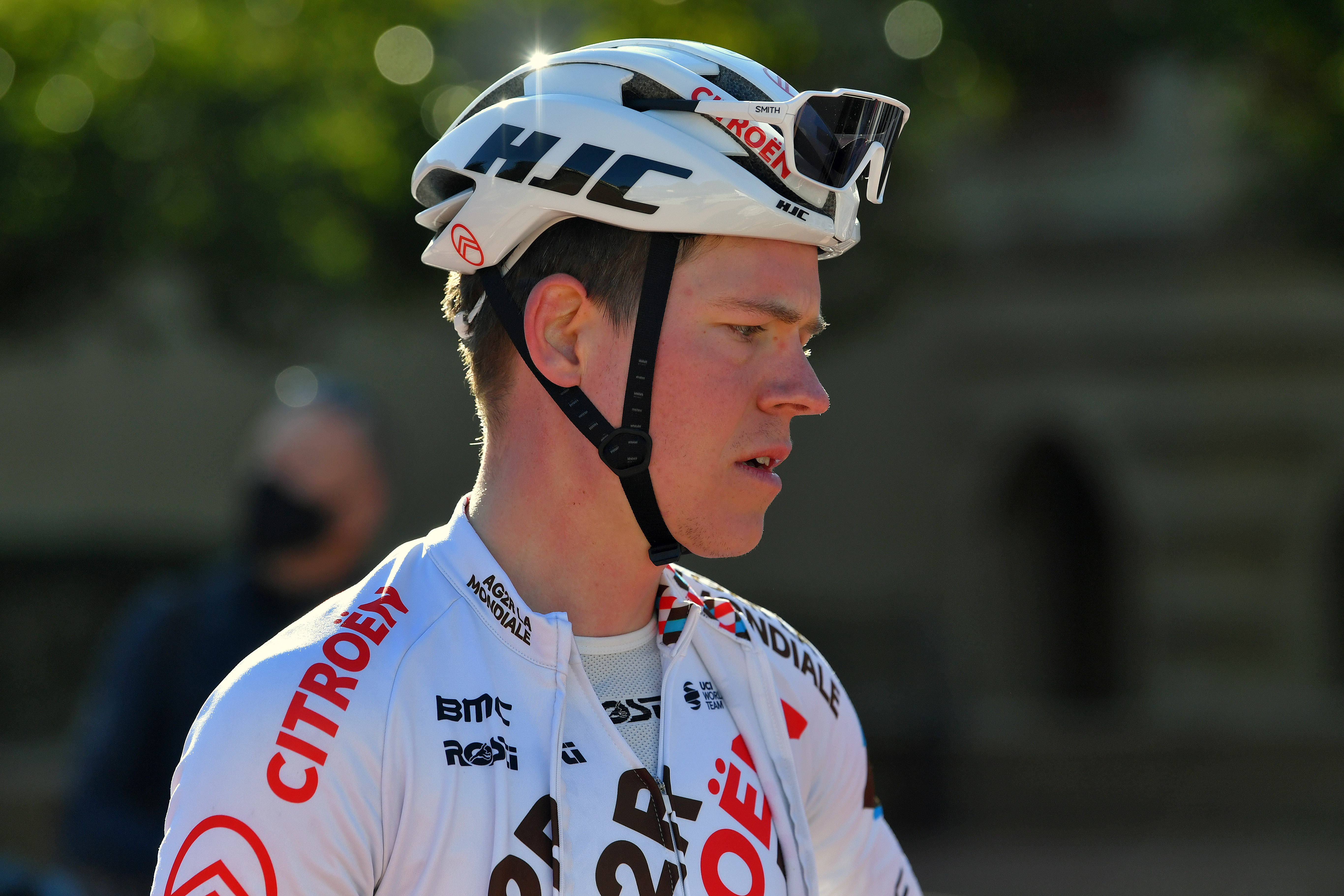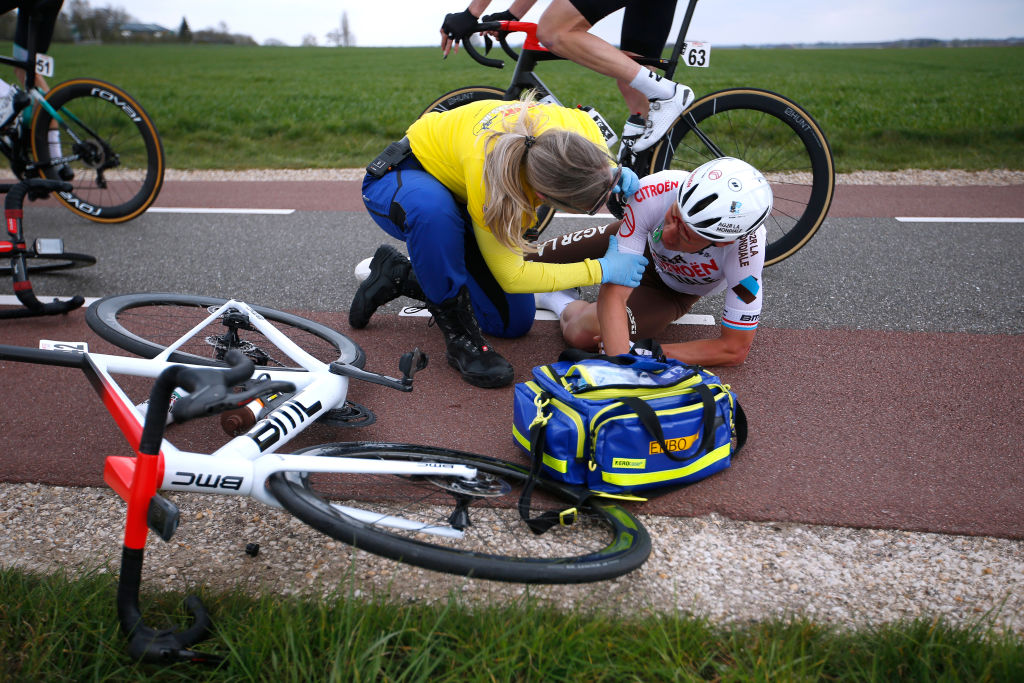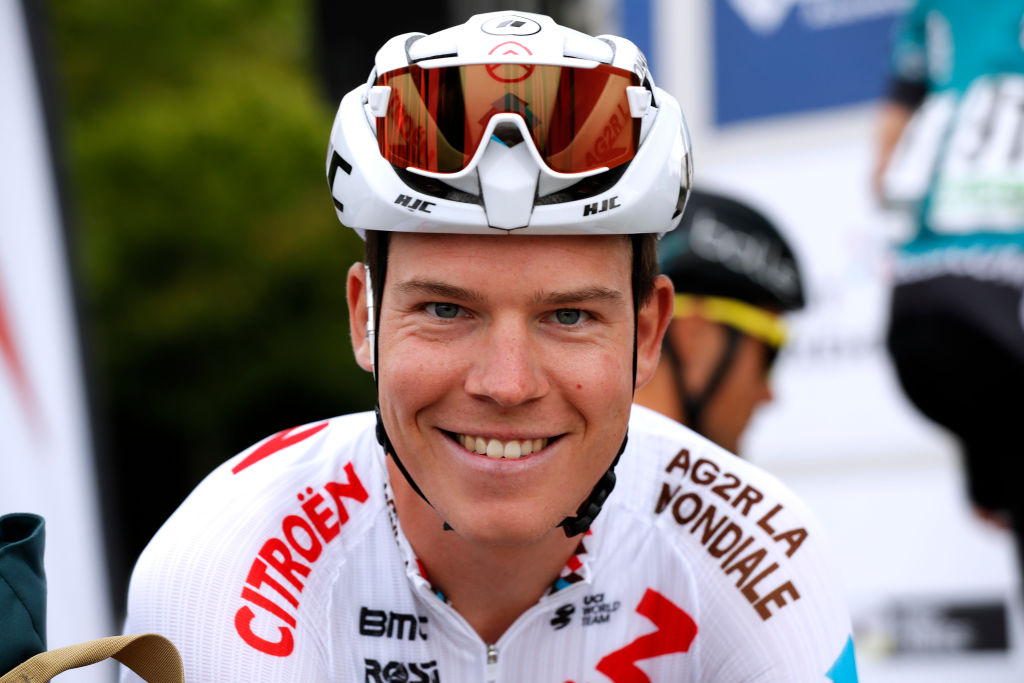Dark days and sleepless nights: Bob Jungels' hidden ordeal
29-year-old opens up about the mental toll of long-undiagnosed injury

For Bob Jungels, a piece of what appeared to be bad news turned out to be some of the best he'd ever had.
In June, at a medical facility in Belgium, he was told he had arterial endofibrosis – a rare condition that inhibits blood flow – in both legs. It might just have saved his career. It has certainly turned his life around.
“When I got the diagnosis, it was quite a serious injury, but honestly, it was a big relief,” the Luxembourger tells Cyclingnews in an off-season interview in the French Alps. “It just answered so many questions.”
It’s not hard to see that Jungels has had a rough year. What’s not so apparent is that he has had a rough two-and-a-half years, and that his struggles on the bike have had a knock-on effect on his life in general, depriving him of sleep, harming his relationships, and sucking the joy out of everyday encounters.
“I did go through some dark moments,” he says. “The last two years were mentally very tough, I have to say.
“But I’m happy to be sitting here now and that I can tell you this, because I would hate for it to be like the last two years, where say I hope to do well in this race and this race and this race, subconsciously knowing it’s not going to happen. But now I see again the possibility to win big races.”
For a long time, everything seemed to come so easily to Bob Jungels. He won a world title as a junior, the U23 Paris-Roubaix, and four races in his neo-professional year. He went on to become a Grand Tour contender, twice finishing top-10 at the Giro d’Italia, while also winning Classics in the hills of the Ardennes and on the cobbles of Flanders.
Get The Leadout Newsletter
The latest race content, interviews, features, reviews and expert buying guides, direct to your inbox!
His talent was such that the only real difficulty seemed to be deciding what exactly to do with it. Then that difficulty disappeared.
“My career was always going steady up, steady up, and it looked like there was no real limit to it, but then it just faded off, without any obvious reason,” he said. “I never knew what it was to be in a gruppetto, but I’ve now experienced the other side of the coin, and over quite a long time.”
The first time he reluctantly accepted that ticket to the so-called ‘autobus’ towards the back of affairs was at the 2018 Tour de France, which is where he traces the endofibrosis back to.
“I remember it was on the Col des Saisies, I was with Adam Yates and we were dropped, and it just came on from one moment to another, and there was no explanation for it. That was the year I won Liège…
“There’s a pain that comes when you spend two or three minutes above threshold, when your muscles aren’t getting the oxygen they need. It’s like a sting, then a numbing, then it just dies off. It’s obviously not there all the time. It’s a problem with blood flow, so it’s worse in stage races because you recover less. In training it’s rare you go above threshold for long periods, so it’s a hard problem to find.”
Still, Jungels went on to finish 11th overall in that Tour de France, and the problems were no more apparent to the outside world as he reinvented himself as a cobbled Classics rider in 2019, winning Kuurne-Brussel-Kuurne, nearing winning E3, and placing fifth at Dwars door Vlaanderen. However, he never really got going at the Giro d’Italia and his season fizzled out from there.
2020 was much more anonymous, and the blanket mitigation of the pandemic didn’t quite cover it.
“I was struggling [mentally] in 2020 as well," Jungels says. "The whole COVID thing didn’t help, but I also had a contract year. I wasn’t the same rider, and I just knew subconsciously there was something off. I had sleeping problems, this and that, didn’t enjoy going on the bike. I mean, I did my job – I always do what I have to do – but it just didn’t happen for me.”
Falling flat

Things got even worse in 2021. Jungels was a marquee signing at a new-look AG2R Citroën Team but fell completely flat. His Ardennes campaign was scuppered by a crash but hopes had already been dashed by bruising early-season encounters at Paris-Nice and the Volta a Catalunya. Similar struggles were to come at the Tour de Suisse in June.
“I couldn’t even follow the bunch sometimes,” he says. “I remember in Catalunya, I was devastated, because I was training hard, doing everything I should and could. It was very tough, I have to say.
“I had periods where I was not happy to ride my bike. At Suisse there was this uphill start. You start the race and you just know you will be dropped. That’s the worst feeling in the world. For me, as someone who normally competes to win, it was degrading.
“You lose your character,” he adds. “My character changed; I had no more joy. I could see it with the team; I’m normally an open person but there was something stopping me from being open. I knew something was off and it held me back from enjoying what I was doing.”
These problems weren’t confined to Jungels’ professional life, and soon seeped into his personal life, too.
“Over the last two years I’ve had a lot of sleep problems, and I think it mostly comes from that, because I knew subconsciously that something was off. Sometimes it was terrible. I just couldn’t sleep. I was overthinking so much," he said.
"You come home, you bring that frustration home with you, and then it’s with the family, the girlfriend, everyone. They suffer as well. It was a tough period. The mental part is not to be underestimated.”
Jungels tried to keep the faith – in himself, in the belief his talent couldn’t have just evaporated into thin air – but it became increasingly difficult to do so. As he struggled to get to the root of his issues, he faced the prospect of them continuing indefinitely.
“That would have been a very bad situation for me,” he said. “I wouldn’t want to end my career in that way.”
Could Jungels, so richly talented and only recently-turned 29, really see his career slipping away?
“Maybe not my career, but I just couldn’t see myself not competing for victories anymore. I couldn’t imagine having another role. That’s just my character. I want to be one of the best – ideally the best. I think I would have been very very unhappy if I had to keep going on this way. It would have probably ended in a bad way. I’m not sure if I would have ended my career earlier, but less happy, for sure.”
Turning point

Thankfully, Jungels is no longer grappling with that scenario and is instead looking ahead to the 10th season of his career with renewed hope and optimism.
The turning point came in the summer, just after that miserable Tour de Suisse. Following countless efforts to tease out the cause of his malaise, including repeat bike fittings and numerous binned cleats, one of the AG2R coaches, Nicolas Guille, suggested it could be endofibrosis – a condition he’d suffered as a rider.
Jungels returned to Luxembourg with his coach, Stephen Barrett, to prepare for the national championships and the Tour de France but it was soon decided there were more pressing matters at hand and they booked in for tests in Belgium.
“It was quite clear. I had it on both sides, which they’d never seen,” Jungels said.
“I had surgery just a week after diagnosis. It was a shitty period because I had nationals, the Tour, and Olympics, coming up, but I said ‘I can’t race with the knowledge that I’m only at 70 or 80 per cent’. I just wanted to get that surgery done as soon as possible.”
With arteries blocked at the top of both legs, it was a double operation, but both procedures were said to have gone as well as possible. A weight was immediately lifted.
“I was just happy to have solved it, and to be back being the person I was before - like… smiling. A week after, one of my best mates was like ‘ah, it’s so nice to see you smiling again’. And all I was doing was laying on the couch, still in pain because of the surgery.
“During the summer I spent a lot of time with friends doing stuff I could never do before, like a proper summer holiday. I reset everything to zero, which was very important to enjoy being a bike rider again.”
Jungels returned to competition on home soil at the Tour de Luxembourg in mid-September. He finished the week in anonymous 80th place but it was still a victory of sorts: he was pain-free.
There wasn’t much left of the season by that point, and he went on to race Paris-Bourges and Paris-Tours, the latter seeing him back up at the business end of affairs on the gravel tracks through the Vouvray vineyards.
“At first, my physical shape was not good enough to reach my old level, but the last two weeks of the season I could really feel it. I actually said to my coach, ‘this is how I felt when I was a junior – I can just go as hard as I can and don’t have pain’,” Jungels said.
“I just hope to be able to reproduce that next year. Nobody knows, but I will have a shot again and this [endofibrosis] will not harm my performance anymore. Someone asked me what I would wish for in 2022 and I said ‘I just want to be able to use 100 per cent of my capacity again’. That’s all I can ask for.”
Jungels acknowledges that, right now, this is “all based on hope” and yet, his optimism for the return of his physical powers is in part based on the certainty that he is mentally stronger than before.
“I was always someone who was trying to solve everything by himself and also I didn’t have many problems to solve. So I got to know that side of myself, how I deal with difficult situations,” he said.
“If I’m ever in a situation like this again, I would handle it differently, try to be more open about it and not close myself in. It will hopefully make some minor complications in the future easier to overcome.”
Off-season interviews tend to lead to which races are on the agenda for the year ahead, and off-season interviews with Bob Jungels tend to lead to which ones he’s going to decide to do well in.
This time around, however, it doesn’t seem to matter whether it’s the cobbles, the Ardennes, the mountains, or the time trials.
“I just want to get the feeling back,” he says. “I see it as a second chance - a second chance to get back to where I was before.
"I won’t take it for granted anymore – that’s the best way to put it.”
Patrick is a freelance sports writer and editor. He’s an NCTJ-accredited journalist with a bachelor’s degree in modern languages (French and Spanish). Patrick worked full-time at Cyclingnews for eight years between 2015 and 2023, latterly as Deputy Editor.
